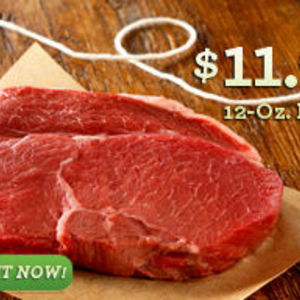Tallgrass Beef: Beef with a Mission
I enjoy a steak or a hamburger as much as the next guy. On the other hand, I don't know about the next guy but I don't like hardening my coronary arteries, polluting the environment, or contributing to the rise of deadly antibiotic-resistant bacteria. Thus, I eat pretty much only Tallgrass Beef, or grass-fed beef from other local and sustainable producers. What is the connection among these things? Read on... **A Brief History of Beef** *Family Farming Goes Industrial* Cows are supposed to eat grass. That is pretty much it. And for most of recorded history, this is exactly what they did - up until about 40 or 50 years ago, when the industrialization of agriculture got going in full swing in this country. (Unlike in Argentina, where no one needs to say "grass-fed beef" because *all* beef *is* grass-fed.) Any industrial process is geared toward mass production, and this is not at all a bad thing when it comes to manufacturing drywall or television sets. But when industrial principles appropriate for making manufactured good are applied to an activity like farming, which is a complex activity with ramifications for our personal well being, the fertility of the land, and the health of the larger ecosystem, serious problems arise. A cow is not, after all, anything like a plasma TV. When we try to pretend that they are, it is a complete disaster on all fronts. *Grass versus Corn* Industrial farms have the goal was to make as much beef as possible, as quickly and cheaply as possible. Instead of letting cows graze on grass, a process that requires time and considerable skill, why not just feed them corn, which makes them fat fast, and, being heavily subsidized by the government, has the benefit of being quite cheap to boot? Well, one reason is that cows have no genetic ability to digest corn, so they tend to get very sick. Industrial farms thus have to administer large quantities of antibiotics - they are in fact among the largest consumers of such products - which then end up in the beef, and are thought to be responsible for the rise horrific, antibiotic-resistant strains of bacteria - so-called "super bugs" like MRSA, which are a threat to public health. Another issue is that whereas beef from grass-fed cows is healthy (full of Omega-3 and 6 acids and low in saturated fat), the beef that comes from corn-fed cows is unhealthy, full of the saturated fats that contribute to epidemic levels of heart disease. According to the Tallgrass website, grass-fed beef is "higher in Vitamin A, Vitamin E, CLAs; has a better balance of Omega-3 and Omega-6 fatty acids; has a favorable unsaturated fatty acid ratio; and provides more dietary protein." Finally, grass-fed cows tend to live on smaller family farms or ranches, where they are part of a more sustainable ecosystem in which the byproducts in one area of the farm (e.g., manure) are used as inputs elsewhere (e.g., fields). Large industrial farms, by contrast, generate enormous, unusable quantities of manure that simply become waste. Often these wastes are just kept on site or placed in "waste lagoons," where they have a tendency to infiltrate and poison the groundwater that people in the area depend on. I could go on and on. (Actually, I think I just did.) For those who want to go even deeper on this issue, check out some eye-opening books, like Michael Pollan's *The Omnivore's Dilemma*, *Food, Inc.*, and others. Suffice it to say that industrial farming is not good for anyone - except for the executives of Big Agriculture and Big Beef. Hey, I just want a hamburger. What does all of this have to do with Tallgrass Beef? I'm getting to that. Tallgrass Beef was founded when TV personality Bill Kurtis decided to produce beef sustainably on a ranch he owns in Kansas. Tallgrass uses sustainable practices, including feeding the cows only on grass. Because of its success in the market, Tallgrass is now supplied by other sustainable, grass-based producers. The beef is delicious, good for your health, and respects the animals and the environment. All of the beef you'll get comes from verified sources and known producers. (If your ground beef is multi-national, you probably don't want it.) It is a bit more expensive than industrial beef, but not very much more. When you consider the hidden costs of cheap food, it is not cheap at all. My Viewpoint Go get yourself a pound of delicious Tallgrass beef (or other grass-fed beef that is produced locally and/or sustainably). Make yourself a hamburger that tastes great, is good for you, and won't harm the environment.
KriticalKen
Chicago, IL
